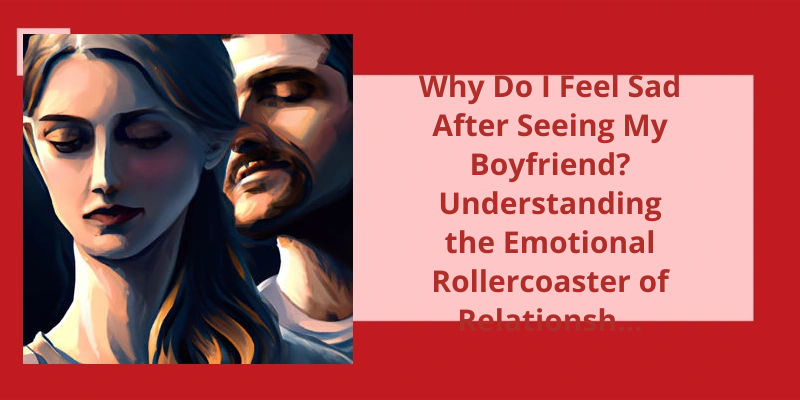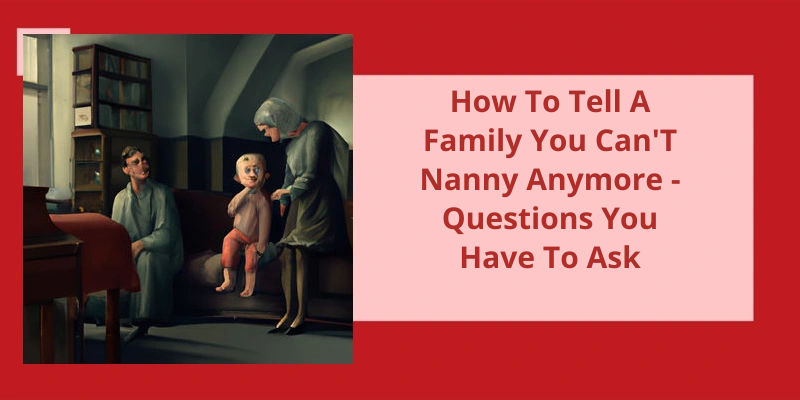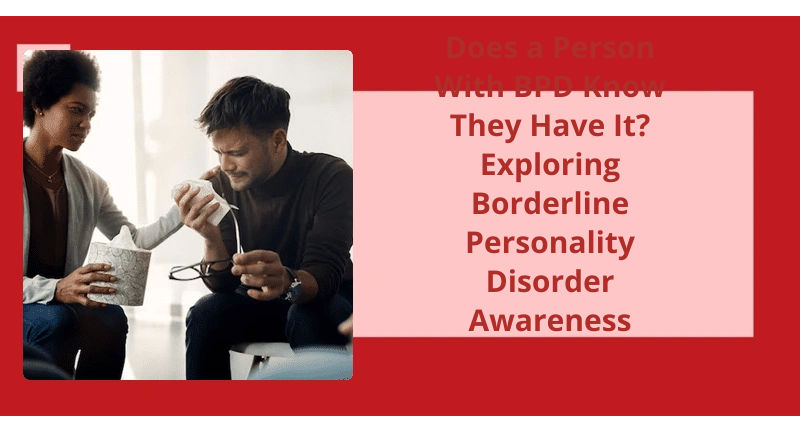As humans, we experience a wide range of emotions that can be difficult to cope with at times. One of the most common emotions that we experience is sadness, and it can be triggered by a variety of different things. In particular, the emotions that we feel in our relationships can be some of the most potent and difficult to deal with. It isn’t uncommon for individuals to feel sad after seeing their boyfriends or partners, even if they’ve a great relationship. This feeling may be due to a number of different factors, such as cognitive dissonance, unfulfilled expectations, or simply being tired or overwhelmed. Whatever the cause may be, it’s important to acknowledge and address these feelings in order to better understand ourselves and our relationships.
Is It Normal to Be Sad When in Love?
It can be a confusing feeling as we’re conditioned to expect happiness and joy when we’re in love. However, sadness in such an intimate relationship isn’t uncommon. Sometimes, it’s due to the fear of losing the person we love, while at others, it can be due to past experiences of hurt and disappointment in love.
Sadness in a relationship can also be triggered by unmet expectations or unfulfilled desires. We may have a certain picture in mind of how our relationship should be or what we want from our partner, and when those expectations aren’t met, it can lead us to feel sad or even depressed.
That being said, if the sadness or negative emotions persist and start to affect our daily life, it may be wise to seek professional help. Speaking to a therapist or a counselor can provide us with the tools and support we need to process our emotions and navigate any challenges in our relationship.
Moreover, it’s important to communicate with our partner about our feelings. Open and honest communication can help to strengthen our relationship and build trust between partners. It can also help to identify any underlying issues that may be causing the sadness and work towards finding a solution together.
Feeling sad or even melancholic when in love isn’t uncommon. It can be triggered by various factors, including fear of loss, unmet expectations, or past experiences. Seeking professional help or communicating with our partner can provide us with the support we need to navigate any challenges and strengthen our relationship.
How to Distinguish Between Normal Sadness in a Relationship and Signs of an Unhealthy or Toxic Relationship.
- Constant feelings of sadness or emptiness in the relationship
- Excessive jealousy or possessiveness from one or both partners
- Frequent arguments or conflicts without resolution
- Feeling trapped or controlled in the relationship
- Poor communication and lack of trust
- Physical, emotional or verbal abuse
- Neglect or disregard for each other’s feelings and needs
- Feeling like you’ve to walk on eggshells around your partner
- Isolation from friends and family
- Lack of support and encouragement for personal growth and development
As humans, we often find ourselves overwhelmed with emotions, especially when it comes to love. And sometimes, amidst all the happiness and joy, we experience a sense of sadness that can leave us feeling confused and even helpless. But what causes this sadness? To understand this better, we must delve deep into the complex nature of human emotions and the inner workings of our minds.
Why Does Being in Love Make Me Sad?
When we’re in love and feel emotionally attached to another person, we become vulnerable. We open ourselves up to the possibility of pain, disappointment, and rejection. This vulnerability can trigger our fears and insecurities, leading to negative emotions such as sadness. It’s this fear of losing our loved one or not being loved in return that can cause us to feel sad.
The feelings of sadness that arise from being in love can also be a result of our past experiences. We all carry emotional baggage from past relationships, childhood experiences, and traumas. When we become emotionally involved with someone else, it can trigger these past wounds, causing us to feel sadness and pain. Often, we aren’t even aware that these past experiences are affecting us, and it can take time to uncover and heal them.
Another reason why being in love can make us sad is that we tend to put a lot of expectations on our relationships. We expect our partner to understand us, to be there for us, and to fulfill all our emotional needs. However, this isn’t always possible, and when our expectations aren’t met, we can feel disappointed and sad. It’s important to manage our expectations and realize that our partner isn’t responsible for our happiness.
The intensity of emotions that come with being in love can also be overwhelming, especially if we haven’t experienced it before. We may feel out of control and unable to manage our emotions, causing us to feel sad and anxious. It’s essential to take the time to understand our emotions and to practice self-care to manage them effectively.
Lastly, the sadness that comes with being in love can be a natural part of the process of falling in love. Love is a complex emotion that involves a range of feelings. We may feel happiness and joy one moment, and then, as we get to know our partner more, we may experience sadness or anxiety. As we navigate our feelings and learn more about ourselves and our partners, we can come to a place of acceptance, understanding, and love.
Through self-reflection, communication, and openness, we can learn to manage our emotions and find happiness and fulfillment in our relationships.
The Role of Self-Love and Self-Esteem in Managing Emotions in Relationships
The way we feel about ourselves affects how we manage emotions in relationships. When we practice self-love and have healthy levels of self-esteem, we’re more likely to handle our emotions in a constructive manner. This can lead to healthier relationships where emotions are managed with greater ease and effectiveness.
It’s understandable to feel a sense of loss and sadness when your partner leaves, especially if you’ve become accustomed to having them around. However, this is a normal reaction and doesn’t necessarily mean anything negative about your relationship.
Is It Normal to Feel Sad When Your Partner Leaves?
It’s normal to feel a sense of sadness or loneliness when your partner leaves, especially if you’re used to being in their company for extended periods. While some people may be able to adapt more easily to changes in their routine, for others it can be a major adjustment to go from seeing their partner every day to being alone. Feelings of sadness and missing your partner are completely valid, and acknowledging them can help you cope with the separation.
Sometimes, the way we feel when our partner leaves can also be tied to our attachment style or history of previous relationships. People who’ve experienced abandonment or rejection in the past may be more prone to feelings of anxiety, insecurity or sadness when their partner leaves. It’s also possible that your attachment style may influence how you perceive your partners absence, with some people being more comfortable with alone time than others.
It’s important to remember that experiencing sadness when your partner leaves is a completely normal part of being in love. Emotions are complex and sometimes overwhelming, but they’re also temporary. If you find yourself struggling to cope with your feelings, it may be helpful to talk to a therapist or trusted friend who can offer support and guidance.
It’s important to validate your feelings and understand that they aren’t a reflection of your relationship or your worth as a person. By acknowledging your emotions, taking care of yourself and seeking support when needed, you can navigate the challenges of separation and maintain a healthy, strong relationship.
Tips for Coping With Feelings of Sadness When Your Partner Leaves
- Allow yourself to feel the sadness
- Talk to someone you trust about how you’re feeling
- Write down your thoughts and feelings in a journal
- Keep yourself distracted with activities you enjoy
- Take care of yourself physically by getting enough rest and exercise
- Consider seeking professional help if your sadness persists
- Remember that it takes time to heal and it’s okay to grieve
Going through a breakup or a divorce can be incredibly hard emotionally, and often those feelings linger long after the actual event. Loneliness is a common experience for many people, and it can be especially prevalent after a partner leaves. While it may be tempting to isolate oneself, it’s important to remember that there are ways to cope with these feelings and connect with others.
Why Do I Feel Lonely After My Partner Leaves?
It’s natural to feel lonely after a significant other leaves. When youre used to spending time with someone who was an important part of your life, suddenly finding yourself alone can be jarring. It’s also possible that you may have developed a sense of co-dependency in your relationship, and now that your partner is gone, you no longer have that person to rely on. This can exacerbate feelings of loneliness and create a sense of uncertainty about your future.
One way to deal with these feelings is to allow yourself to grieve the end of the relationship. Just like any other type of loss, the end of a relationship can be a difficult and painful time. It’s important to give yourself space to feel these emotions and work through them in a healthy way. Seek out support from family and friends who can help you through this difficult time.
Another way to cope with feelings of loneliness after a break-up is to focus on self-care. Take time to do things that make you happy and bring you joy, whether thats spending time in nature, trying new hobbies, or connecting with friends in a new way. Prioritize your health and well-being, including getting enough sleep, eating healthily, and exercising regularly. Not only will these self-care practices help you feel better physically, but they’ll also boost your emotional well-being and help you feel less lonely.
It’s also important to recognize that feelings of loneliness after a break-up are temporary. While the healing process may take some time, it’s important to recognize that you’ll eventually get through this difficult time. Accepting that the end of the relationship is a new chapter in your life can be helpful in moving forward.
It’s important to recognize that it’s okay to feel sad and alone, and that these feelings are a normal part of the grieving process. By allowing yourself to feel your emotions, focusing on self-care, and seeking support from others, you can start to rebuild your life and find happiness again.
The Role of Therapy in Coping With Feelings of Loneliness After a Break-Up
- Therapy can provide a safe and supportive space to process the emotions that come with a break-up.
- A therapist can offer tools and techniques for managing feelings of loneliness, such as self-care practices, mindfulness exercises, and cognitive strategies.
- Talking to a therapist can help individuals gain insight into their patterns of behavior and relationships, allowing them to make healthier choices in the future.
- Group therapy sessions can provide additional support and a sense of community for those experiencing loneliness after a break-up.
- Therapy can also address any underlying mental health conditions, such as depression or anxiety, that may be contributing to feelings of loneliness.
Taking steps to improve your relationship can be daunting, but it’s important for your emotional wellbeing. By working with your partner and seeking outside help, you can start to address the issues causing your sadness and find ways to strengthen your relationship.
How Do I Stop Being Sad in a Relationship?
Being in a relationship that makes you feel sad or unhappy can be a challenging and stressful experience. It isn’t uncommon to feel this way when couples encounter issues or challenges that are difficult to overcome. However, it’s essential to recognize that unhappiness can negatively impact the relationships quality, and it’s crucial to address it if you want to strengthen your bond with your partner.
Identifying the factors that are causing you to feel sadness or negativity is the first step towards resolving your relationship issues. It could be related to communication, trust, or conflicting expectations. Once you’ve identified the core problem, it’s crucial to approach your partner with a calm and constructive attitude, allowing them to understand how you feel and to discuss the potential ways of resolving the issue. This way, your partner will understand your point of view, and both of you can brainstorm on how to make things better.
Asking for support from loved ones can also help you cope with the challenges you’re facing in your relationship. It’s vital to surround yourself with people you trust and who’ve your best interests at heart. You can vent to them or ask for advice on how to deal with your relationship issues. However, keep in mind that their advice should be taken with a grain of salt because they aren’t involved in your relationship and may not have an accurate understanding of your situation.
Seeing a therapist or couples counselor can be a great option for couples experiencing unhappiness or conflicts in their relationship. These professionals provide a safe, non-judgmental environment where couples can share their thoughts and feelings and work towards finding solutions. Therapy can help you and your partner develop better communication skills, gain insight into each others perspectives, and learn to cope constructively with relationship difficulties.
It’s important to take care of yourself emotionally, mentally, and physically as well. Try to engage in activities that make you happy, meditate, or exercise to alleviate any pent-up emotions. Taking care of yourself will enable you to approach your relationship issues in a more balanced and constructive way, and you’ll be better equipped to help your partner work through the tougher spots in your relationship.
Identifying the core problem, discussing it with your partner, seeking support from loved ones, and seeing a therapist are all helpful ways to move forward constructively. Remember, addressing relationship issues is a journey, and with patience, understanding, and effective communication, you can overcome even the toughest challenges.
It’s important to understand that the connection between relationships and depression is complex and multifaceted. While some relationships can certainly exacerbate or even cause depression, it’s not always that simple. In fact, even seemingly healthy relationships can still leave people feeling unfulfilled or unhappy, leading to depression. In this article, we’ll explore the different ways that relationships and depression can be intertwined, and provide some insights into how individuals can cope with relationship-related depression.
Can a Relationship Be the Cause of Depression?
For some individuals, relationship problems can become a source of stress and conflict that leads to depression in some cases. These problems can arise due to issues like financial disagreements, infidelity or a lack of emotional support. In some cases, people may also feel triggered by their partners behavior or actions, which can lead to feelings of hopelessness and despair.
For instance, someone may be struggling with feelings of loneliness or isolation due to a lack of companionship or social support. Other people may struggle with issues like jealousy, resentment or insecurity, which can lead to feelings of low self-esteem and a negative self-image.
Furthermore, people who suffer from depression may struggle to communicate their emotions effectively within their relationships, leading to misunderstandings and tension. This can create a vicious cycle that exacerbates feelings of depression and anxiety, making it harder to address the underlying problems.
Depression can be caused by a wide range of factors, including genetics, environmental influences, and personal life experiences. While relationships can certainly play a role in triggering depression, it’s essential to evaluate the many possible causes and seek professional support to manage the symptoms of this condition.
To prevent depression from harming your relationships, it’s important to recognize the signs and symptoms of depression early on. This includes feelings of sadness, hopelessness, and despair, as well as a loss of interest in activities you once enjoyed. If you or someone you know is struggling with these symptoms, it’s essential to seek out medical or psychological support as soon as possible.
By seeking out healthy communication, empathy and support, relationship difficulties can be tackled and overcome to rebuild better and happier relationships.
Source: Relationship depression: Impact, causes, and support
Conclusion
However, it’s important to evaluate the reasons for the sadness and communicate with one's partner about any concerns or issues. It may also be helpful to seek support from friends, family, or a therapist to process and address feelings of sadness or other difficult emotions. Ultimately, taking care of one's own emotional well-being is crucial in any relationship, as it allows for open communication, trust, and a deeper connection with one's partner.






